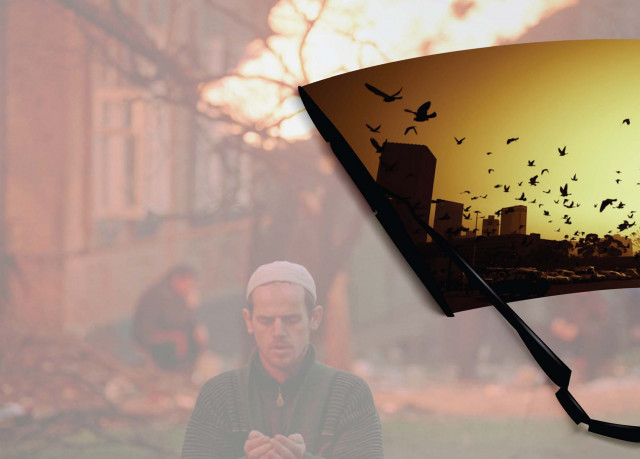A year on, the trauma still haunts people
Signs of the devastating bomb blast at Meena Bazaar can still be seen today.

A visit to the bazaar today will reveal a market full of life, with bumper-to-bumper traffic of honking cars, rickshaws, pushcarts and horse carts. But signs of the devastating bomb blast that killed more than 120 people and injured over 200 people can still be seen.
The destroyed mosque is still under construction. A nearby banner, fluttering in the breeze asks for donations, saying that the provincial government did not give the Rs5 million that Chief Minister Ameer Haider Khan Hoti had promised for victims.
Panaflex banners destroyed by fire and destruction due to the blast are still hanging on some buildings.
Baryal Khan’s body, like many others, was never recovered. Two of Faisal’s maternal uncles also perished in the blast. The circumstances for the family suddenly changed from affluent to meagre.
Masood, Shah, Faisal’s maternal uncle and a shopkeeper in Meena Bazaar, recalls how he had gone out of his shop on an errand. “Upon reaching Pipal Mandi, I heard a huge bang and ran back. All hell had broken loose when I got back.”
Kalsoom’s house, near the bazaar, was also caught in the blast’s radius. She, her mother-in-law and father-in-law were injured.
Her father-in-law stayed in the hospital for a day before getting discharged, but without a slip. But the government, Kalsoom said, asks for a discharge slip before it disburses the compensation money. She herself lost a few teeth in the blast and needs Rs15,000 to replace them. There was a sense of despair in her voice as she uttered, “What do we do?”
Shamshad, the mother-in-law, however is grateful that all of her family members survived. “That’s enough for me,” she said.
Then there are some who still live in denial and offer alternative explanations for what happened. Dost Muhammad -- who runs a shop in a nearby street and sustained head, arm and leg injuries -- is one of them.
He does not believe it was a car bomb that spread devastation on October 28. He points to a destroyed fourth floor of a nearby building. “If the blast occurred on the road, how did the top floor get destroyed when the ones beneath it are just fine.”
Something hit the mosque from above, Dost Mohamamd insists.
Tariq Haideri, President of Cherikoban Traders Association (CTA), told The Express Tribune that people had started coming back to the bazaar but the rush is not even a fraction of what it used to be before the blast.
He added that at least 90 per cent of the people affected by the blast had been given the compensation money. The CTA, he said, had taken up the remaining cases with Sarhad Chamber of Commerce and Industry and hehopes they will get their money soon.
Faisal’s uncle Masood is one of the remaining 10 per cent. He lost two brothers and a brother-in-law in the blast. Two of their shops were completely destroyed.
While he was paid compensation money for those that died, he never got reimbursed for his financial losses. “Those who had resources were given compensation for their losses, but people like me are still to get anything,” Masood told The Express Tribune.
Shah now takes care of his sister’s three children, including Faisal, who was in class one a year ago. But Faisal does not go to school anymore though.
Published in The Express Tribune, October 28th, 2010.



1724319076-0/Untitled-design-(5)1724319076-0-208x130.webp)















COMMENTS
Comments are moderated and generally will be posted if they are on-topic and not abusive.
For more information, please see our Comments FAQ